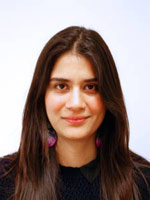Abstract Claus Jørgensen:
"Tumours are complex systems defined by heterotypic interactions between cancer and stromal cells. Pancreatic ductal adenocarcinoma is characterised by an extensive desmoplastic reaction, which on average constitutes ~85% of the tumour volume. Tumour cells co-opt host cells, such as fibroblasts and myeloid cells, which leads to a pathological remodelled extracellular matrix and cell to cell interactions ultimately changing tumour cell function and response to therapy. The rules governing tumour-stromal interactions are currently not clearly defined. Recently we described an oncogene-driven signalling axis, whereby cancer cells co-opt stromal fibroblasts to alter secreted signals ultimately leading to increased signalling pathway activation in the cancer cells (Tape et al Cell 2016). To further our understanding of tumour-stroma interactions, and to better understand the impact of tumour cell diversity, we established a model of intra-tumoral heterogeneity in PDA. Intriguingly we find both differences in stromal fibroblast co-option across individual clones and ensuing tumour cell response to reciprocal signals. Together our data suggests that clonal tumour cell populations differentially engage nearby stromal cell populations, which may further complicate selection of therapies."
Abstract Nathalia Chica's talk: "Genome-wide regulatory landscape of autophagy dynamics in budding yeast"
"Misregulation of autophagy relates to several human pathologies including cancer, inflammatory diseases, neurodegeneration, and aging. These associations raise the importance of the study of autophagy and consequently, the hunt for new drug targets. With our study, we aimed not to only identify new activators and inhibitors of autophagy but to map the genome-wide regulation of autophagy dynamics using yeast due to the high conservation between yeast and mammals. Therefore, we performed a high-content screening with confocal imaging of a collection of 5800 yeast gene deletion mutants, by which we temporarily monitored autophagy levels using mNeonGreenAtg8 and Pep4mCherry as reporters during nitrogen deprivation and replenishment. To characterize the regulation of autophagy dynamics on a population and single cell-level, we developed machine-learning approaches, where we defined autophagic cell states and trained multi-layered neural nets, based on the spatial kinetic changes of mNeonGreen-Atg8 signal-features. Using a model-based strategy we assessed kinetic perturbations and generated profiles of autophagy regulation for the entire yeast genome that were subsequently used for the identification of genes and biological circuits that control autophagy. As a result, we have identified the genome-wide network that controls regulation and the autophagy dynamics in yeast, and we have found multiple novel genes contributing to feedback regulation and autophagy inactivation. All in all, we have established a robust platform for phenotype identification and mapping of the genome-wide control of autophagy in yeast, to further the understanding of the autophagy dynamic response in higher eukaryotes."

